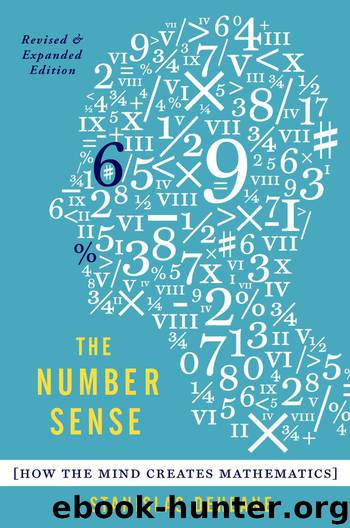The Number Sense by Dehaene Stanislas

Author:Dehaene, Stanislas
Language: eng
Format: epub
Publisher: Oxford University Press, USA
Published: 2011-02-25T16:00:00+00:00
Talent and Mathematical Invention
In the final analysis, where does mathematical talent come from? Throughout this chapter, every track that we have explored has led us to a plausible source. Genes probably play a part. But, by themselves, they cannot supply the blueprint of a phrenological “bump” for mathematics. At best, together with several other biological factors, perhaps including precocious exposure to sex hormones, genes may minimally bias cerebral organization to aid the acquisition of numerical and spatial representations. Biological factors, however, do not weigh much when compared to the power of learning, fueled by a passion for numbers. Great calculators are so passionate about arithmetic that many prefer the company of numbers to that of fellow humans. Whoever dedicates that much time to numbers must succeed equally well in increasing memory, and in discovering efficient calculation algorithms.
If only one lesson might be drawn from this analysis of talent, it would be that high-level mathematics departs radically from its popular portrayal as a dryly rational discipline, dominated by sheer deductive power, on which emotions have no bearing. Quite the contrary, the most potent of human emotions—love, hope, pain, or despair—hold sway over the relationship these mathematicians entertain with their number friends. When there is a passion for mathematics, talent does not lag very far behind. If, conversely, a child develops math anxiety, this phobia can prevent even the simplest of mathematical concepts from falling into place.
My survey of mathematical talent has given equal footing to Ramanujan and Michael, Gauss and Dave, the genius and the idiot savant. Yet, can one really compare the giants that extend the frontiers of mathematics and the autistic prodigies that shine only because of the striking contrast between their mathematical abilities and their profound mental retardation? My choice is justified by the many characteristics that geniuses and calculating prodigies share—from their passion for mathematics to their vision of a landscape populated by numbers. In my opinion, it would be unfair to deny Inaudi or Mondeux the name of “genius” under the pretext that they merely rediscovered well-known mathematical results. When a shepherd, alone in his pasture, rediscovers Pythagoras’s theorem, his talent is no less than that of his renowned predecessor, to whose work he was never exposed.
In this chapter, I have deliberately avoided dwelling on the psychological and neuro-biological preconditions that underlie mathematical creativity. The flash of invention is so brief that it can hardly be studied scientifically At best one can speculate, as did Jean-Pierre Changeux and Alain Connes, that scientific discovery involves the more or less random association of old ideas, followed by a selection based on the harmony and adequacy of a newly formed combination. Paul Valéry said, “It takes two persons to invent: one forms the combinations, the other chooses and recognizes what is desired or relevant among the set of products of the first.” Augustine likewise noted that cogito means “to shake together,” while intelligo means “to select among.”
Jacques Hadamard, in his major investigation of invention in mathematics, distinguishes stages of preparation, incubation, illumination, and verification.
Download
This site does not store any files on its server. We only index and link to content provided by other sites. Please contact the content providers to delete copyright contents if any and email us, we'll remove relevant links or contents immediately.
Periodization Training for Sports by Tudor Bompa(8240)
Why We Sleep: Unlocking the Power of Sleep and Dreams by Matthew Walker(6688)
Paper Towns by Green John(5168)
The Immortal Life of Henrietta Lacks by Rebecca Skloot(4569)
The Sports Rules Book by Human Kinetics(4373)
Dynamic Alignment Through Imagery by Eric Franklin(4201)
ACSM's Complete Guide to Fitness & Health by ACSM(4043)
Kaplan MCAT Organic Chemistry Review: Created for MCAT 2015 (Kaplan Test Prep) by Kaplan(3994)
Livewired by David Eagleman(3757)
Introduction to Kinesiology by Shirl J. Hoffman(3755)
The Death of the Heart by Elizabeth Bowen(3599)
The River of Consciousness by Oliver Sacks(3590)
Alchemy and Alchemists by C. J. S. Thompson(3506)
Bad Pharma by Ben Goldacre(3414)
Descartes' Error by Antonio Damasio(3264)
The Emperor of All Maladies: A Biography of Cancer by Siddhartha Mukherjee(3135)
The Gene: An Intimate History by Siddhartha Mukherjee(3086)
The Fate of Rome: Climate, Disease, and the End of an Empire (The Princeton History of the Ancient World) by Kyle Harper(3049)
Kaplan MCAT Behavioral Sciences Review: Created for MCAT 2015 (Kaplan Test Prep) by Kaplan(2973)
